The dosa has many variants in Chitrapur Saraswat cuisine. And, it’s come to a restaurant near you (well, kind of)
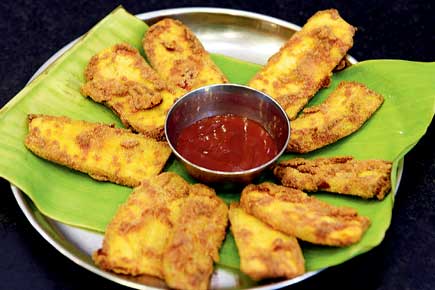
Kele phode
A left turn from Borivli (W) station takes you to Simply Saraswat. Interestingly, it stands on a road named after Sir NG Chandavarkar, a prominent 20th century social reformer and a Saraswat himself. Serendipitous. “We didn’t know of this Saraswat connection when we decided on this location,” says Rashmi Ubhaykar, owner of the five-month-old restaurant that offers a cuisine dedicated to the Chitrapur Saraswat Brahmin community. A Chitrapur herself, Ubhaykar felt the area’s Gujarati and Jain demographic would accept the cuisine far easily than those in other parts of the city.
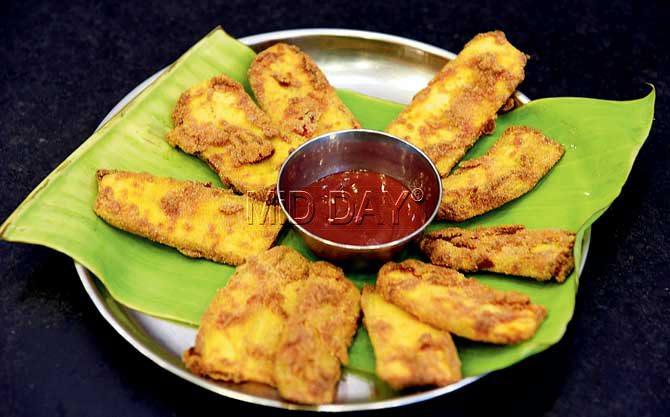
Kele phode, priced at Rs 50 work well as starters
Interestingly, this is the first restaurant dedicated to Chitrapur Saraswat cuisine in Mumbai that has also started tiffin delivery for their food across the city. This writer is from the community and can vouch how difficult it is to find community cuisine outside mom’s kitchen, aside from the odd dish such as the upkari — cooked ivy gourd garnished with fresh coconut and jaggery — at Mangalorean restaurants like Matunga’s Rama Nayak.
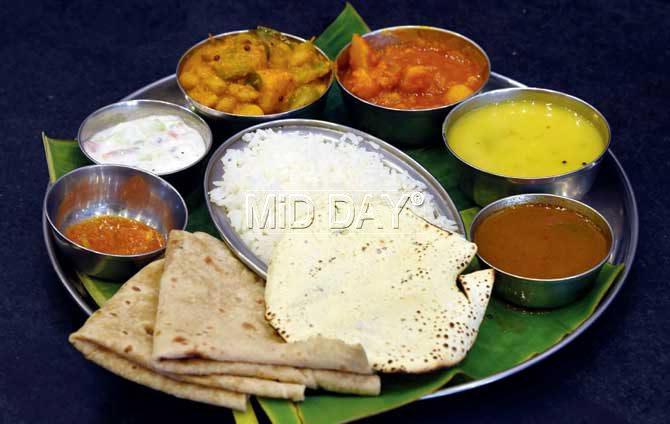
The Saraswat thali priced at Rs 110
The Chitrapur Saraswat Brahmins are a Konkani-speaking community, believed to have originally lived on the banks of the Saraswati River in Kashmir. It is believed that around 1,500 years ago, they migrated to the area around present day Mangalore. Today, its population stands at 25,000 globally.
Though, both Chitrapur and Gaud Saraswats trace their roots to the Kashmir Valley, differences are apparent in the dialect of Konkani they speak. The food is largely similar. However, while Gauds use a lot of coconut oil, a typical Chitrapur kitchen will be moderate in its use. While the former tempers its fish curry with spices, the latter doesn’t. There are other differences too. While the Gauds are a prominent entrepreneurial community, Chitapurs prefer careers in the arts, finance and sciences.
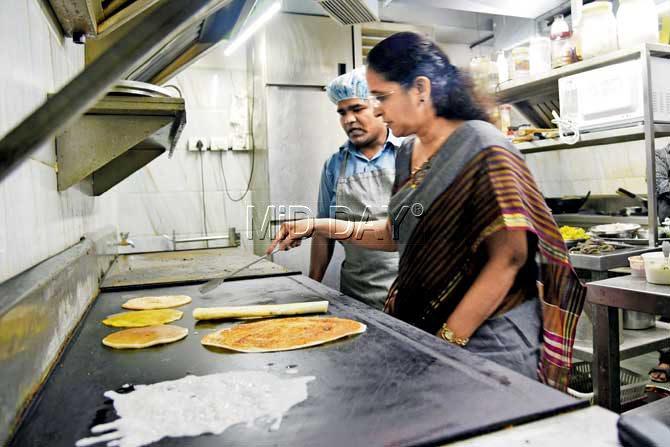
Rashmi Ubhaykar, 54, directs one of 15 chefs at her Borivli (W) restaurant Simply Saraswat. A Chitrapur Saraswat Brahmin, Ubhaykar has spent a lifetime cooking traditional cuisine and wants it better represented on Mumbai’s culinary map. Pics/Nimesh Dave
Of ghee, jaggery and coconut
The décor of the eatery brings Mangalore alive in Mumbai. On the wall is a recreation of the rathotsava, a festival celebrated in April where the deity is taken around town in a hand-drawn carriage. Bathed in the green of banana leaf, the menu retains the Konkani names of the dishes. There’s the pana pollo (neer dosa), loni pollo (udad dosa topped with desi makkhan). “Although people have a hard time pronouncing the names, we chose to retain the authentic names,” says Ubhaykar, who at 54 years, decided to enter the hospitality business in a bid to gainfully use the free time she had.
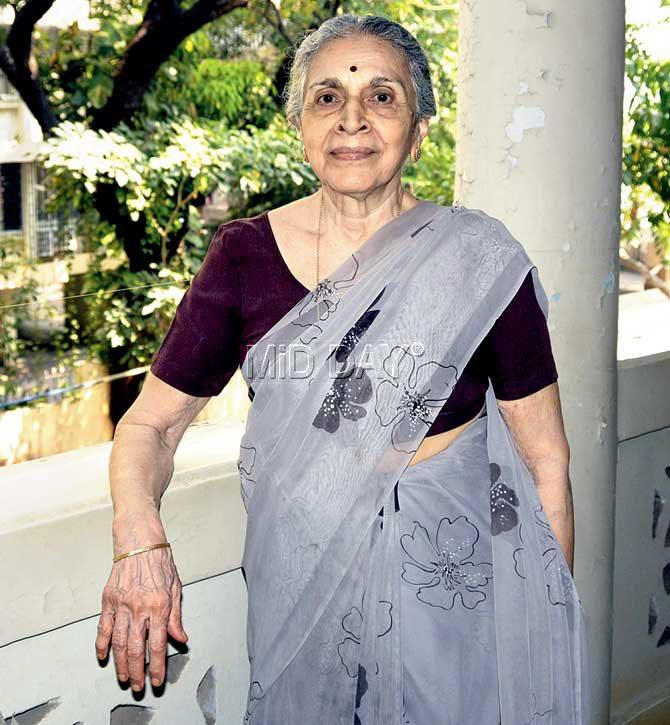
In 1985, Meera Hattangadi translated Ambabai Samsi’s Raschandrika, a Saraswat cookbook, into English. The book is a must-have in every Saraswat household; a traditional gift for brides. Pic/Bipin Kokate
As we enter the restaurant around noon, we find ourselves glad for the cooler offered to us. However, amidst the nimbu shinkaji (a potent mix of lime, mint leaves, ginger and soda; (Rs 40), lassi and chaas, what we realise is missing is the traditional Chitrapur cooler: the panak. It’s an aamchi — the Konkani word for ours — thirst quencher with jaggery, pepper and cardamom added to boiling water and then cooled. It’s a sweet drink with a spicy punch and is prepared on special occasions. The drinks menu is limited. Besides the coolers, there’s kashai (a herbal hot drink) and filter coffee. Cocktails have been deliberately omitted as they ‘don’t go with South Indian food.’
On the starter menu is the kele phode or banana crispies. For Rs 50, you are served raw bananas marinated in chilli powder, turmeric, asafoetida, coated with semolina and then deep fried. At first bite, we are reminded of crispy bombil fry only to realise that it’s a vegetarian eatery. Sensing our disappointment, Ubhaykar says, “We stuck to a vegetarian menu because of the taste of locals.” Not many know this, but dosas (or pollo) are integral to Saraswat cuisine as to other South Indians. Thus, the pollo platter.
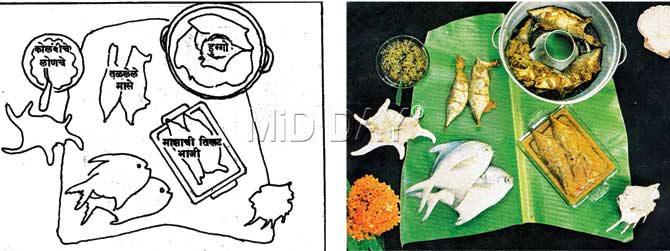
While cooking dishes the right way is important, stress is also laid on how they are served. The Raschandrika shows the way with illustrations and photos of how a meal is laid out.
At Rs 250, this one is the most expensive dish on the menu, with six mini dosas, neer dosa, surnoli (made with poha, dahi, jaggery, salt and topped with makkhan), kanara sada pollo (plain dosa), teen daali pollo (made of moong, udad and chana dal) served with puddi chutney. Puddi chutney is the lesser known cousin of gunpowder, made of roasted putana dal (fried chana dal), curry leaves, red chillies and asafoetida. The odd pollo is the spinach corn cheese dosa, here to appease the more modern palette.
What is unmissable is the batata song in the thali. It is a mildly spiced gravy prepared using boiled potatoes, onions, byadgi chillies and tamarind, ground to a smooth paste with coconut oil. The song meets our expectations with the masalas cooked to perfection. If you prefer a sweeter gravy, try the signature dish: kayrus. This is made with a masol (ground wet masala of chana dal, sesame seeds, coriander seeds, coconut, tamarind, red chillies and jaggery). The dish has capsicum, potato and peanuts.
If the Ubhaykars wonder how many takers their 60-seater eatery will find, Vinay Gangavali is a happy tale to tell. In 2006, the resident of Talmakiwadi, a 75-year-old Saraswat cooperative housing society in Tardeo, turned home chef, making dosa, surnoli and kayrus at home. After getting a go-ahead from the neighbours he’d tested his dishes on, Gangavali began getting orders from residents of neighbouring societies as well. Today, he has 25 days of business every month, with orders for occasions ranging from marriages to funerals. The attraction, he says, is that the cuisine, which includes a lot of pulses is healthier compared to most.
For those who fear the community recipes will be lost, fret not. In 1943, Ambabai Samsi — a member of the community — wrote the Raschandrika, a Saraswat cookbook. Since then, it’s been gifted to brides. In 1985, Meera Hattangadi translated the book to English. Hattangadi, a housewife was then on the managing committee of the Saraswat Mahila Samaj, a women-only organisation involved in cultural and charitable activities. “Even today, ever aamchi household will have a copy of this book. Young brides still refer to it while preparing Saraswat dishes,” she says.
 Subscribe today by clicking the link and stay updated with the latest news!" Click here!
Subscribe today by clicking the link and stay updated with the latest news!" Click here!








